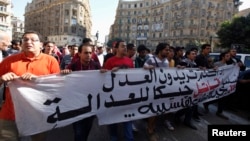CAIRO —
Egyptian authorities have ordered the arrest of two leading political activists in connection with a new law limiting protests. The move comes a day after security forces used tear gas and water cannons to break up demonstrations.
Egypt's top prosecutor accuses activists Ahmed Maher and Alaa Abdel Fattah of inciting protests in response to the new law on demonstrations.
Egyptian human rights groups say 50 protesters have already been arrested following Tuesday's demonstrations.
The new law says protesters must give authorities three days notice of any public gatherings. Failure to do so could result in fines of more than $40,000 and up to seven years in prison.
The law, which went into effect Sunday, was widely seen as an attempt to curb recurring protests by the Muslim Brotherhood angry over the ouster in July of Islamist president Mohamed Morsi.
But Tuesday's protests were unrelated, with one called to mark the anniversary of the killing of a young political activist, the other against the military trial of civilians.
Government officials have argued the new law will help restore stability to Egypt, which in addition to political protests is facing increased violence from jihadis, mainly based in the Sinai peninsula, and other extremists. Authorities also said the law was needed to prevent disruptions to traffic.
Law’s legitimacy questioned
Mohamed Fawaz of the opposition April 6 Movement Democratic Front, who took part in Tuesday's protests, finds the official arguments false.
"We are standing against the real terrorist of the state who have been rul[ing] by the martial [emergency law] system, killing innocent people, arresting righteous lawyers, arresting righteous political activists in such a way that has no relationship with human rights or has no relationship with the real January 25 revolution or even the 30 June revolution," says Fawaz.
A spokeswoman for Human Rights Watch, Tamara al-Rifai, notes other countries regulate protests, but says her group has concerns over Egypt's requirement of a three-day notification period, which it considers too far in advance. She also says the limit on any gathering of 10 people or more is far too restrictive.
Al-Rifai also points out that popular protests have been central to Egypt's political life since the uprising against ex-president Hosni Mubarak nearly three years ago.
"We also request a clarification on how you give back the right to Egyptians to protest that they snatched on January 2011. We are asking if this is a way of taking this right away from them. So in that sense what the Egyptians have acquired can only be regulated, it should not be restricted the way this law does," says al-Rifai.
Protesters Tuesday were more blunt, accusing the current government, which came into power on the back of popular protests, of trying to ensure no further protests can unseat it.
Egypt's top prosecutor accuses activists Ahmed Maher and Alaa Abdel Fattah of inciting protests in response to the new law on demonstrations.
Egyptian human rights groups say 50 protesters have already been arrested following Tuesday's demonstrations.
The new law says protesters must give authorities three days notice of any public gatherings. Failure to do so could result in fines of more than $40,000 and up to seven years in prison.
The law, which went into effect Sunday, was widely seen as an attempt to curb recurring protests by the Muslim Brotherhood angry over the ouster in July of Islamist president Mohamed Morsi.
But Tuesday's protests were unrelated, with one called to mark the anniversary of the killing of a young political activist, the other against the military trial of civilians.
Government officials have argued the new law will help restore stability to Egypt, which in addition to political protests is facing increased violence from jihadis, mainly based in the Sinai peninsula, and other extremists. Authorities also said the law was needed to prevent disruptions to traffic.
Law’s legitimacy questioned
Mohamed Fawaz of the opposition April 6 Movement Democratic Front, who took part in Tuesday's protests, finds the official arguments false.
"We are standing against the real terrorist of the state who have been rul[ing] by the martial [emergency law] system, killing innocent people, arresting righteous lawyers, arresting righteous political activists in such a way that has no relationship with human rights or has no relationship with the real January 25 revolution or even the 30 June revolution," says Fawaz.
A spokeswoman for Human Rights Watch, Tamara al-Rifai, notes other countries regulate protests, but says her group has concerns over Egypt's requirement of a three-day notification period, which it considers too far in advance. She also says the limit on any gathering of 10 people or more is far too restrictive.
Al-Rifai also points out that popular protests have been central to Egypt's political life since the uprising against ex-president Hosni Mubarak nearly three years ago.
"We also request a clarification on how you give back the right to Egyptians to protest that they snatched on January 2011. We are asking if this is a way of taking this right away from them. So in that sense what the Egyptians have acquired can only be regulated, it should not be restricted the way this law does," says al-Rifai.
Protesters Tuesday were more blunt, accusing the current government, which came into power on the back of popular protests, of trying to ensure no further protests can unseat it.




